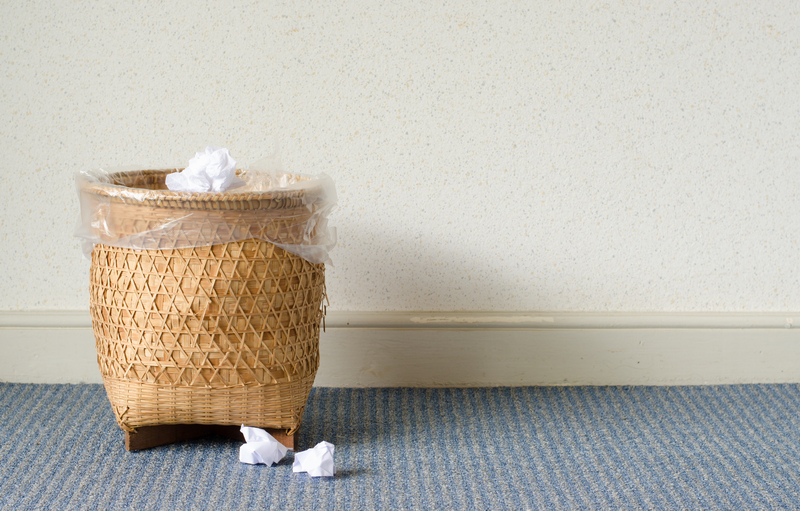Posted on 10/11/2025
Tips for Proper Disposal of Regular Waste
Proper waste disposal is essential for maintaining environmental cleanliness, human health, and public safety. With increasing awareness about environmental sustainability, it's important to understand the various methods for appropriately disposing of regular waste. This article will provide comprehensive tips for effectively managing and disposing of waste generated in everyday life.
Understanding Different Types of Regular Waste
Before diving into disposal tips, it's crucial to understand the different categories of regular waste. Regular waste typically includes:
- Household Waste: General waste generated from households, including food scraps, packaging materials, and non-recyclable items.
- Recyclables: Items that can be processed and repurposed, such as paper, cardboard, glass bottles, and certain plastics.
- Organic Waste: Biodegradable waste, primarily from kitchen scraps and yard trimmings.
- Hazardous Waste: Common household items that contain dangerous substances, such as batteries, paints, and electronic waste.
Properly segregating these types of waste is the first step in ensuring correct disposal.

Segregation at Source
Effective waste management begins at home or the source of waste generation. Here are some tips for segregating waste properly:
- Distinct Bins: Use separate bins for recyclables, organic waste, and general waste.
- Labeling: Clearly label each bin to make it easy for household members to sort waste correctly.
- Education: Educate family members about what items belong in each bin to maintain consistency.
By consistently segregating waste, you make it easier to manage and dispose of it later.
Recycling
Recycling is one of the most effective methods for managing waste and reducing environmental impact. Follow these guidelines to improve recycling practices:
- Know What to Recycle: Familiarize yourself with the recyclable materials accepted by your local recycling program. Common materials include paper, cardboard, aluminum cans, glass bottles, and certain plastics.
- Clean and Dry: Ensure recyclables are clean and dry before placing them in the recycling bin to avoid contamination.
- Remove Labels and Lids: Some recycling programs require labels and lids to be removed from containers, so check with your local guidelines.
- Flatten Cardboard: Flatten cardboard boxes to save space in your recycling bin.
Effective recycling can significantly reduce the amount of waste that ends up in landfills.
Composting Organic Waste
Composting is an excellent way to manage organic waste and recycle it into useful compost for gardening and agriculture. Here are some tips to get started:
- Compost Bin: Invest in a compost bin or build your compost pile in a suitable location in your yard.
- Avoid Meat and Dairy: Stick to vegetable scraps, fruit peels, coffee grounds, and yard waste. Avoid composting meat, dairy, and oily foods as they can attract pests.
- Layering: Alternate layers of green waste (kitchen scraps) and brown waste (yard trimmings and paper) to balance carbon and nitrogen levels.
- Turn Regularly: Aerate your compost by turning it regularly to speed up decomposition and reduce odor.
Composting not only reduces waste but also produces nutrient-rich soil for gardening.

Proper Disposal of Hazardous Waste
Hazardous waste requires careful handling to prevent harm to humans and the environment. Follow these tips for safe disposal:
- Batteries: Many stores offer battery recycling programs. Alternatively, take used batteries to designated collection centers.
- Electronics: Recycle old electronics through e-waste recycling programs. Many manufacturers and retailers offer take-back programs for their products.
- Household Chemicals: Dispose of paints, solvents, pesticides, and other chemicals at hazardous waste collection centers.
- Check Regulations: Follow local regulations and guidelines for disposing of hazardous waste to ensure compliance and safety.
Proper disposal of hazardous waste prevents contamination and protects the environment.
Community Involvement and Resources
Community involvement is vital for successful waste management. Here are ways to engage with your community and access resources:
- Local Waste Programs: Participate in local recycling and waste disposal programs. Check government websites for information on collection schedules and accepted materials.
- Awareness Campaigns: Volunteer for or initiate community awareness campaigns to educate others about waste management.
- Reusable Options: Promote the use of reusable bags, containers, and other items to reduce waste generation.
- Join Community Clean-Ups: Participate in clean-up events to help keep the local environment clean and encourage responsible waste disposal.
Engaging with community resources and initiatives can amplify the impact of individual waste management efforts.

Innovative Waste Disposal Methods
In addition to traditional methods, consider innovative waste disposal practices that can enhance sustainability:
- Waste-to-Energy: Technologies that convert waste to energy can reduce landfill use and generate power.
- Biodegradable Products: Use biodegradable products whenever possible to minimize long-term environmental impact.
- Zero-Waste Lifestyle: Aim for a zero-waste lifestyle by reducing, reusing, and recycling as much as possible. Shop in bulk, avoid single-use plastics, and repair items instead of discarding them.
- Upcycling: Get creative with upcycling by transforming waste materials into new, useful products.
Incorporating innovative practices can complement traditional waste disposal methods and contribute to a more sustainable future.
Conclusion
Proper waste disposal is a critical component of environmental stewardship. By understanding the different types of regular waste, practicing segregation, recycling, composting organic waste, properly disposing of hazardous waste, involving the community, and exploring innovative methods, we can significantly reduce our environmental footprint. Each small action contributes to a cleaner, healthier planet, making a positive impact for generations to come.
Remember, responsible waste disposal begins with individual choices and extends to community efforts. Let's take the initiative to manage and dispose of our waste properly and create a sustainable future for all.
Latest Posts
Tips for Proper Disposal of Regular Waste
Garbage Cleanup Bags - Efficient Skip Substitute

































 Get a Quote
Get a Quote